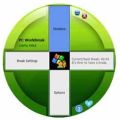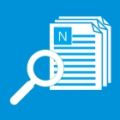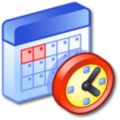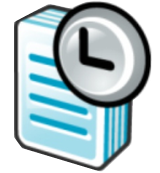Каждый день мы раздаем лицензионные программы БЕСПЛАТНО!

Giveaway of the day — Windows Explorer Tracker 2.0
Windows Explorer Tracker 2.0 был доступен бесплатно 9 февраля 2016 г.
Windows Explorer Tracker создана для автоматической трассировки/мониторинга и записи действий в Windows Explorer, таких как: Удаление, Переименование, Создание, Вставка, Добавление, Перемещение файлов, папок, дисков и накопителей. При помощи программы вы также сможете отслеживать и записывать действия на отдаленных хостах через подключенные сетевые диски. Программа запишет исходные операции в несколько файлов логов и назовет их согласно дате.
Обратите внимание: Программа предоставляет бесплатные обновления на 1 год. Получите 50% скидку на Стандартную лицензию (1 ПК) и Персональную лицензию (3 ПК) с Пожизненными обновлениями только сегодня!
Системные требования:
Windows XP/ 2003/ Vista/ 7/ 8/ 8.1/ 10 (x32/x64)
Разработчик:
TriSun Software LimitedОфициальный сайт:
http://www.trisunsoft.com/windows-explorer-tracker/Размер файла:
5.7 MB
Цена:
$19.99
TriSun Software Limited также предлагает

Программа напоминает, когда следует приостановить работу во избежание получения травм от перенапряжения. В зависимости от вашего режима работы за компьютером, программа предложит в нужное время сделать разминку, пятиминутный перерыв, упражнение для глаз, прогулку. Все настройки можно регулировать.

Быстро находит дубликаты файлов на дисках по содержимому файла, позволяя удалить ненужные файлы и восстановить дисковое пространство, сократив затраты на самостоятельную работу с файлами.

Позволяет просматривать диски/директории/размеры файлов в виде единой древовидной структуры, и легко совершать очистку диска вручную. Программа обрабатывает информацию о ресурсах в пакетном режиме.

Многофункциональный калькулятор времени и дат, который покажет нужный день, количество дней между двумя датами и количество дней от определенной даты.

Advanced Recent Access разработана, чтобы помочь просматривать и открывать недавно использованные ресурсы (файлы и папки). Предоставляет более подробную информацию о недавних файлах: путь, размер, тип, дату последних изменений и дату создания.
GIVEAWAY download basket
Комментарии
Понравилась программа? Оставьте комментарий!
I use freeware Activity Indicator v1.1.5.32 which has more options, and for those laptop users that do not have HDD LEDs, this doubles as an status indicator that you can customize, just be sure to disable logging in that case.
And for those that want even more tools, the extensive freeware WSCC (Windows System Control Center) v2.5.0.7 is the go-to toolbox that you should have on your PC, thumb-drive, recovery disc, etc. It's a powerhouse of tools from Nirsoft and Windows Sysinternals with an attractive GUI that you can customize yourself. The included binaries are in x86 and x64, with GUI option to use the x64 version whenever possible.
Thanks GOTD for showing something new, but today's offer is not for me.
Installed and registered without any difficulties and on opening a clean interface.
After running for a couple hours it has listed a number of files been created deleted etc.
I'm sure there are rare occasions when this information would be useful but the limited functions available do not make it a particularly useful program.
A Free program I have found that is much more useful for gleaning information about what exactly the system is doing is available at the following link:-
http://systemexplorer.net/
Today's download will go in my folder called Tools, it contains many programs both free and paid for that help analyse many problems that occur in a system.
XP-Man
What I like about System Explorer is the Snapshot feature, which can record before and after scenarios which includes registry and file changes occurring on the hard drive. The initial Snapshot takes the longest, but viewing changes using the tree-like structure makes it easy to see what differences have occurred.
The only thing I wish it did right is when opening Windows Registry from it, as it will launch the x86 version instead of the x64 version if on a x64 OS. The end result not seeing the 'full' registry picture if one were to launch it manually, via the Run Box for example, that starts the expected x64 version. To be sure, the x64 version of Regedit has the Wow6432Node that mirrors (for a lack of a better word) what the x86 version of Regedit can show.
System Explorer shines with it's on-demand Virus-Total scanner, useful as a second 'opinion' to the installed protection one has on their PC to test any file either in memory running or on the local drive.
Thanks for your comment XP-Man, and good luck stocking your Tool Box with more awesome programs.
There are 2 usual reasons I think that files are added or deleted -- software installation or removal, or in the course of working on whatever, files get saved & may be deleted.
Though we can forget later, we know when we save or delete a file. We may not know what intermediate or temporary files the software we're using creates, or if it deletes those files afterwards. Working with audio & video files for example, those often temporary files can get quite large, & don't always go away after you close the software. That's one possible use for Windows Explorer Tracker.
We you install software it can be useful to know what get's added where. It helps you to judge that installation's impact on Windows & your system disk, e.g. the other day a GOTD added 300MB to the ProgramData folder, regardless where the program itself was installed, which made a difference for many people running Windows on a SSD -- the size of a SSD depends on how much you spend, with the majority of SSDs in use not having much storage space to spare.
It also helps if/when you decide to remove a program... save the logs from Windows Explorer Tracker that you made during installation, along with those from something like Regshot [which records changes to the registry], & you've got a pretty complete picture of what should be removed. And it can help troubleshooting when installing software breaks something.
If you are someone who doesn't like temporary files sticking around, running Windows Explorer Tracker when software updates should tell you where the update's setup files are stored & if they're deleted afterwards -- I've seen software updates leave over 1GB behind. Similarly you might find it easier than manually checking yourself if Windows 7-8.1 has downloaded, or started to download the setup files for 10.
That said, where it might be most useful would be using Windows Explorer Tracker much the same way IT staff may monitor activity to spot hackers & malware, though granted they have better tools to search the logs looking for trouble. A couple few weeks ago a guy commented on another site that the only sign he had that a system was infected was a keylogger log file he happened to see in the temp folder just by chance. New files are not created or saved all that often, & while looking at what Windows Explorer Tracker records isn't 100% foolproof [companies still have their systems breached despite logging] it could [should] probably help with the more common varieties of malware.
I give the publisher high marks for originality. We tend to see one after another softwares doing similar tasks (video converters, PDF manipulators) so this is an interesting change of pace.
It's not a program I can see me using so I'll decline but I do decline with a big thank you to the publisher and GOTD.


Предложенную программу не знаю, она специфична и для специалистов может быть и полезна. Дело в том, что системы от Microsoft, особенно последние, сохраняют и трассировку и логи объёмом десятки и десятки мегабайт безо всяких сторонних программ. Для обычных пользователей проблема скорее в минимизации и очистки и трассировки и логов. Специалист, разумеется, найдёт всё это "добро" безо всяких сторонних программ, систематизирует и уберёт подальше от посторонних глаз. Разумеется, при необходимости процесс легко автоматизируется средствами системы. Видимо какое-то из подобных решений предлагается для ленивых системных администраторов.
Save | Cancel
Это какая то разновидность шпионского софта?..Трудно найти для него еще какую-нибудь область применения:не хватает только возможности делать снимки экрана и отсылать приватную информацию по сети.Добровольно причем.
Save | Cancel